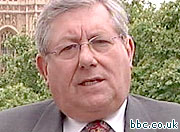Gay rights are more important than the belief that children need both a mum and a dad, the equality regulator has suggested.
But it says vegetarians do have the right to refuse to clean a fridge that may have contained meat.
One MP has called the watchdog a “laughing stock” and another accused it of publishing “frivolous nonsense”.
Enforcer
The Equality and Human Rights Commission (EHRC) enforces equality law, and has the power to haul individuals and organisations off to court.
It has produced new guidelines for how to deal with employees’ beliefs in the workplace.
The guidelines say a magistrate who believes it is best for a child to be brought up by a male-female couple should not be accommodated.
Dignity
That belief hurts the dignity of gay couples, says the Equality Commission, and breaches equality policies.
The report was released in the wake of judgments involving Christians by the European Court of Human Rights.
But many have criticised the guidance from the EHRC, including Tory MP Brian Binley, a member of the Commons business, innovation and skills committee, who called the report “frivolous nonsense” and said small businesses need “not to be weighed down”.
Laughing
And fellow Tory MP Dominic Raab, who is a former international lawyer, said: “The EHRC has become an expensive taxpayer-funded laughing stock”.
A spokesman from the EHRC said: “The Commission does not make the law on what is or isn’t a legitimate religion or belief. This is set by Parliament. It is important to remember that employers are not required to accept these types of request.
“The Commission’s role is to provide free, expert advice to employers helping them understand and deal with what can be complex issues, and helping them avoid potentially costly legal action.”
Discrimination
In January, judges in Strasbourg ruled that Nadia Eweida had suffered discrimination at work because she was told she could not wear a cross.
But judges ruled against three other Christians, including registrar Lillian Ladele who was pushed out of her job for refusing to conduct civil partnerships.

